Entrepreneurial Ventures, Statistics, and Success Factors Report
VerifiedAdded on 2021/01/01
|17
|4368
|372
Report
AI Summary
This report provides an overview of entrepreneurial ventures, including different types such as micro, medium, and social enterprises, and their respective typologies. It analyzes the impact of small and medium-sized businesses on the UK economy, using relevant data and statistics to illustrate their significance. The report further explores the characteristics, traits, skills, and motivational drivers of successful entrepreneurs, highlighting examples and discussing how background and experience, both positive and negative, influence their success. The report also investigates the similarities and differences between various entrepreneurial ventures, providing a comprehensive understanding of the entrepreneurial landscape and its contribution to the growth of the social economy. The report is based on the Red bridge borough council which is a local authority which has more than 35 parks and playgrounds to enjoy.

Entrepreneurship and small
business management
business management
Paraphrase This Document
Need a fresh take? Get an instant paraphrase of this document with our AI Paraphraser
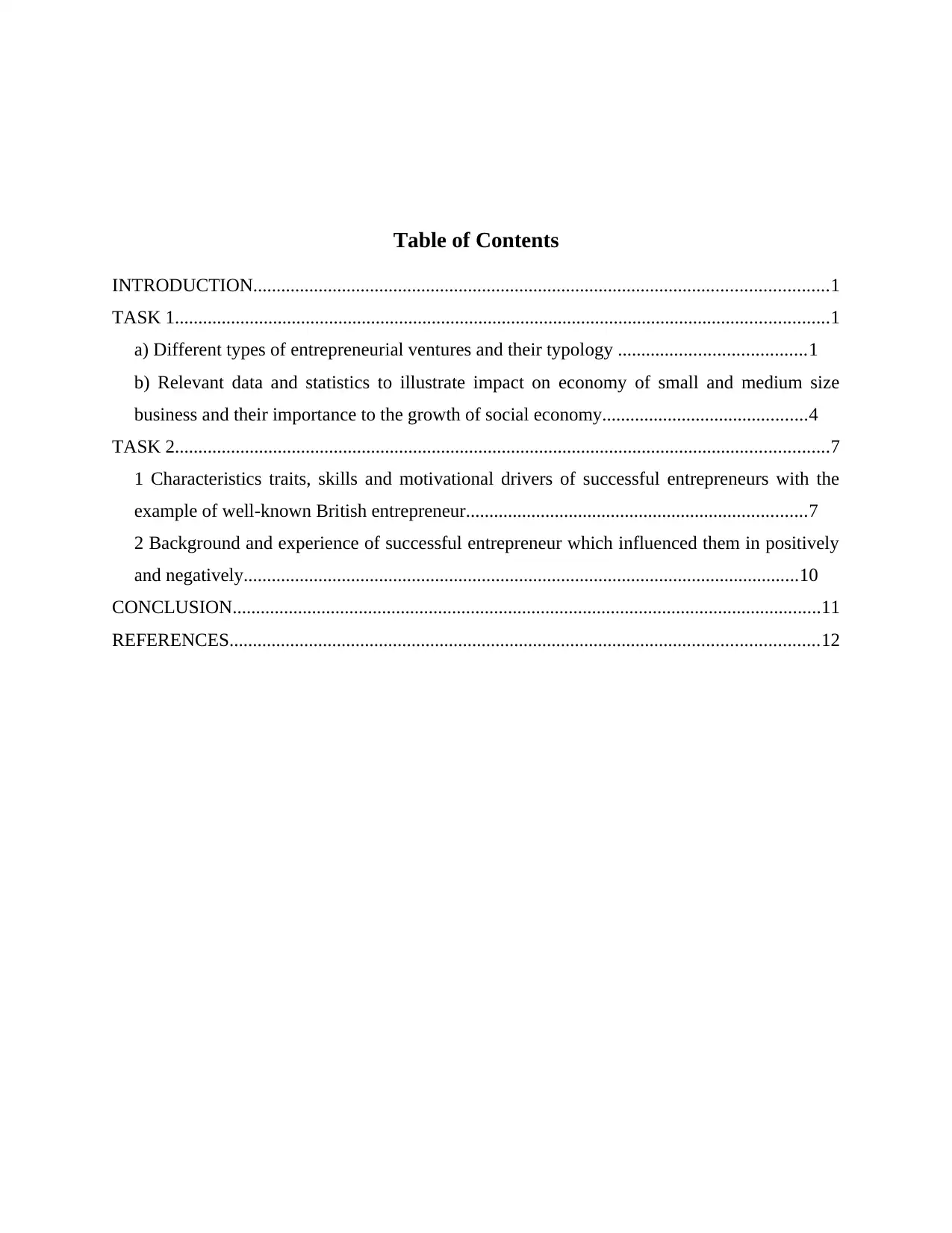
Table of Contents
INTRODUCTION...........................................................................................................................1
TASK 1............................................................................................................................................1
a) Different types of entrepreneurial ventures and their typology ........................................1
b) Relevant data and statistics to illustrate impact on economy of small and medium size
business and their importance to the growth of social economy............................................4
TASK 2............................................................................................................................................7
1 Characteristics traits, skills and motivational drivers of successful entrepreneurs with the
example of well-known British entrepreneur.........................................................................7
2 Background and experience of successful entrepreneur which influenced them in positively
and negatively.......................................................................................................................10
CONCLUSION..............................................................................................................................11
REFERENCES..............................................................................................................................12
INTRODUCTION...........................................................................................................................1
TASK 1............................................................................................................................................1
a) Different types of entrepreneurial ventures and their typology ........................................1
b) Relevant data and statistics to illustrate impact on economy of small and medium size
business and their importance to the growth of social economy............................................4
TASK 2............................................................................................................................................7
1 Characteristics traits, skills and motivational drivers of successful entrepreneurs with the
example of well-known British entrepreneur.........................................................................7
2 Background and experience of successful entrepreneur which influenced them in positively
and negatively.......................................................................................................................10
CONCLUSION..............................................................................................................................11
REFERENCES..............................................................................................................................12

⊘ This is a preview!⊘
Do you want full access?
Subscribe today to unlock all pages.

Trusted by 1+ million students worldwide
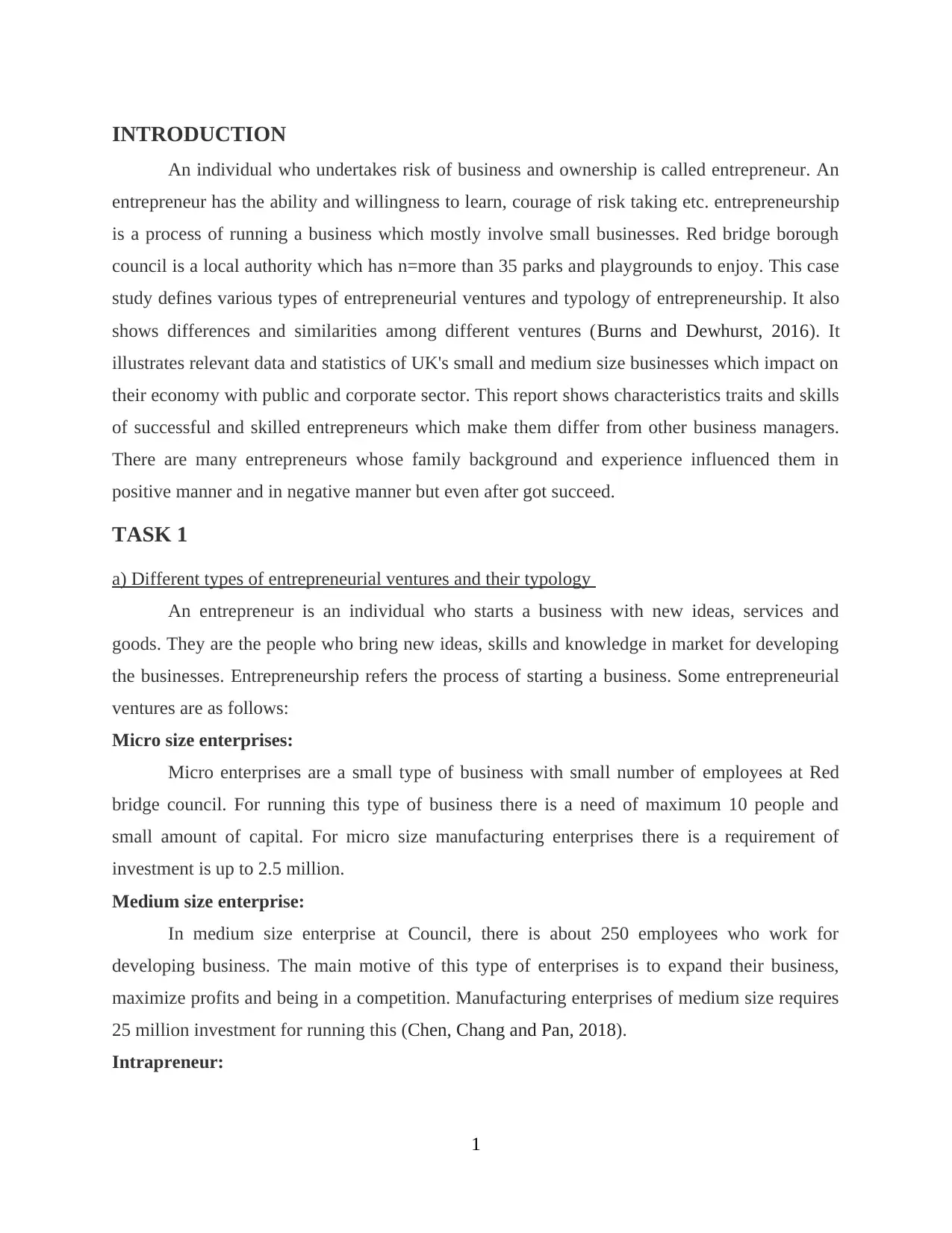
INTRODUCTION
An individual who undertakes risk of business and ownership is called entrepreneur. An
entrepreneur has the ability and willingness to learn, courage of risk taking etc. entrepreneurship
is a process of running a business which mostly involve small businesses. Red bridge borough
council is a local authority which has n=more than 35 parks and playgrounds to enjoy. This case
study defines various types of entrepreneurial ventures and typology of entrepreneurship. It also
shows differences and similarities among different ventures (Burns and Dewhurst, 2016). It
illustrates relevant data and statistics of UK's small and medium size businesses which impact on
their economy with public and corporate sector. This report shows characteristics traits and skills
of successful and skilled entrepreneurs which make them differ from other business managers.
There are many entrepreneurs whose family background and experience influenced them in
positive manner and in negative manner but even after got succeed.
TASK 1
a) Different types of entrepreneurial ventures and their typology
An entrepreneur is an individual who starts a business with new ideas, services and
goods. They are the people who bring new ideas, skills and knowledge in market for developing
the businesses. Entrepreneurship refers the process of starting a business. Some entrepreneurial
ventures are as follows:
Micro size enterprises:
Micro enterprises are a small type of business with small number of employees at Red
bridge council. For running this type of business there is a need of maximum 10 people and
small amount of capital. For micro size manufacturing enterprises there is a requirement of
investment is up to 2.5 million.
Medium size enterprise:
In medium size enterprise at Council, there is about 250 employees who work for
developing business. The main motive of this type of enterprises is to expand their business,
maximize profits and being in a competition. Manufacturing enterprises of medium size requires
25 million investment for running this (Chen, Chang and Pan, 2018).
Intrapreneur:
1
An individual who undertakes risk of business and ownership is called entrepreneur. An
entrepreneur has the ability and willingness to learn, courage of risk taking etc. entrepreneurship
is a process of running a business which mostly involve small businesses. Red bridge borough
council is a local authority which has n=more than 35 parks and playgrounds to enjoy. This case
study defines various types of entrepreneurial ventures and typology of entrepreneurship. It also
shows differences and similarities among different ventures (Burns and Dewhurst, 2016). It
illustrates relevant data and statistics of UK's small and medium size businesses which impact on
their economy with public and corporate sector. This report shows characteristics traits and skills
of successful and skilled entrepreneurs which make them differ from other business managers.
There are many entrepreneurs whose family background and experience influenced them in
positive manner and in negative manner but even after got succeed.
TASK 1
a) Different types of entrepreneurial ventures and their typology
An entrepreneur is an individual who starts a business with new ideas, services and
goods. They are the people who bring new ideas, skills and knowledge in market for developing
the businesses. Entrepreneurship refers the process of starting a business. Some entrepreneurial
ventures are as follows:
Micro size enterprises:
Micro enterprises are a small type of business with small number of employees at Red
bridge council. For running this type of business there is a need of maximum 10 people and
small amount of capital. For micro size manufacturing enterprises there is a requirement of
investment is up to 2.5 million.
Medium size enterprise:
In medium size enterprise at Council, there is about 250 employees who work for
developing business. The main motive of this type of enterprises is to expand their business,
maximize profits and being in a competition. Manufacturing enterprises of medium size requires
25 million investment for running this (Chen, Chang and Pan, 2018).
Intrapreneur:
1
Paraphrase This Document
Need a fresh take? Get an instant paraphrase of this document with our AI Paraphraser
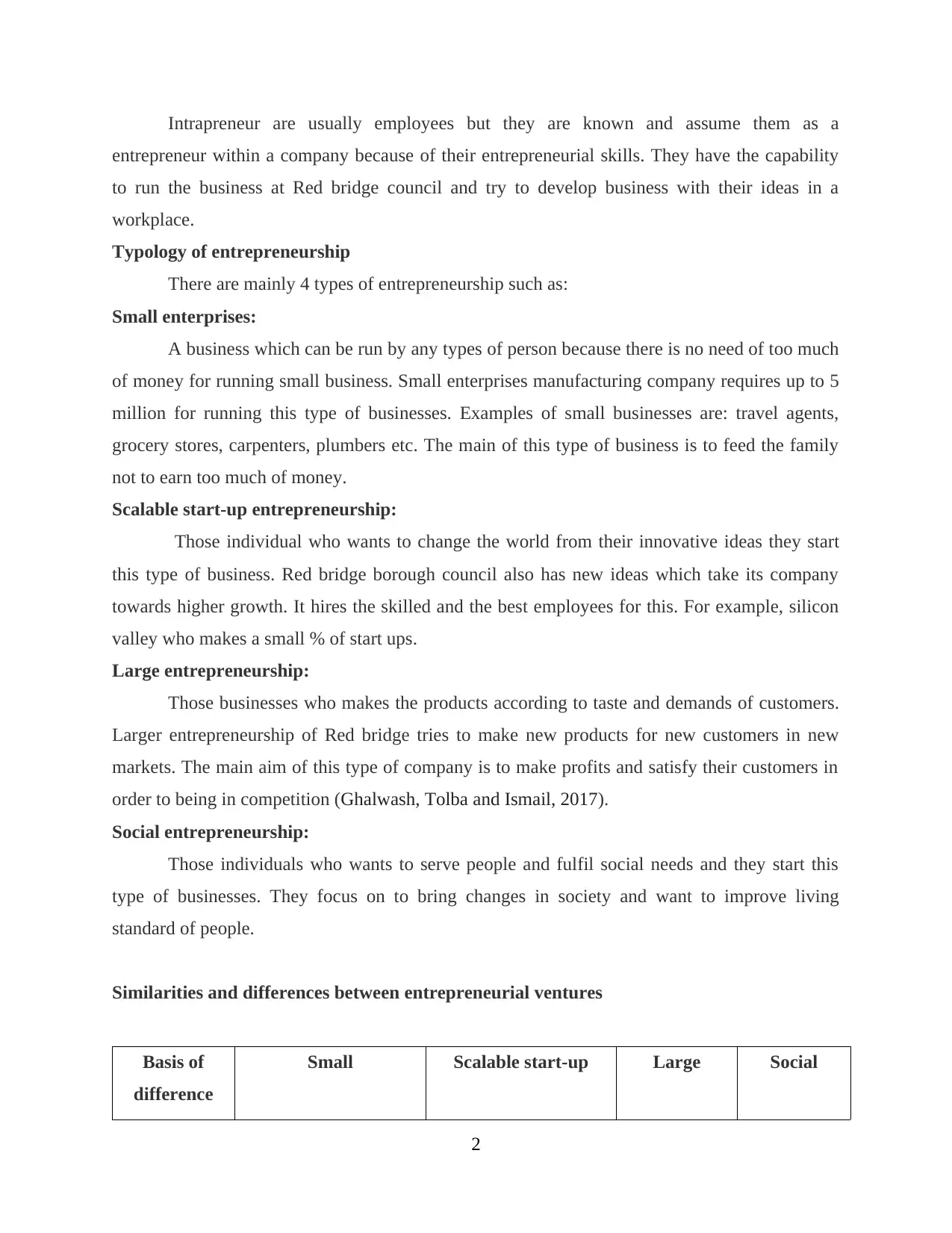
Intrapreneur are usually employees but they are known and assume them as a
entrepreneur within a company because of their entrepreneurial skills. They have the capability
to run the business at Red bridge council and try to develop business with their ideas in a
workplace.
Typology of entrepreneurship
There are mainly 4 types of entrepreneurship such as:
Small enterprises:
A business which can be run by any types of person because there is no need of too much
of money for running small business. Small enterprises manufacturing company requires up to 5
million for running this type of businesses. Examples of small businesses are: travel agents,
grocery stores, carpenters, plumbers etc. The main of this type of business is to feed the family
not to earn too much of money.
Scalable start-up entrepreneurship:
Those individual who wants to change the world from their innovative ideas they start
this type of business. Red bridge borough council also has new ideas which take its company
towards higher growth. It hires the skilled and the best employees for this. For example, silicon
valley who makes a small % of start ups.
Large entrepreneurship:
Those businesses who makes the products according to taste and demands of customers.
Larger entrepreneurship of Red bridge tries to make new products for new customers in new
markets. The main aim of this type of company is to make profits and satisfy their customers in
order to being in competition (Ghalwash, Tolba and Ismail, 2017).
Social entrepreneurship:
Those individuals who wants to serve people and fulfil social needs and they start this
type of businesses. They focus on to bring changes in society and want to improve living
standard of people.
Similarities and differences between entrepreneurial ventures
Basis of
difference
Small Scalable start-up Large Social
2
entrepreneur within a company because of their entrepreneurial skills. They have the capability
to run the business at Red bridge council and try to develop business with their ideas in a
workplace.
Typology of entrepreneurship
There are mainly 4 types of entrepreneurship such as:
Small enterprises:
A business which can be run by any types of person because there is no need of too much
of money for running small business. Small enterprises manufacturing company requires up to 5
million for running this type of businesses. Examples of small businesses are: travel agents,
grocery stores, carpenters, plumbers etc. The main of this type of business is to feed the family
not to earn too much of money.
Scalable start-up entrepreneurship:
Those individual who wants to change the world from their innovative ideas they start
this type of business. Red bridge borough council also has new ideas which take its company
towards higher growth. It hires the skilled and the best employees for this. For example, silicon
valley who makes a small % of start ups.
Large entrepreneurship:
Those businesses who makes the products according to taste and demands of customers.
Larger entrepreneurship of Red bridge tries to make new products for new customers in new
markets. The main aim of this type of company is to make profits and satisfy their customers in
order to being in competition (Ghalwash, Tolba and Ismail, 2017).
Social entrepreneurship:
Those individuals who wants to serve people and fulfil social needs and they start this
type of businesses. They focus on to bring changes in society and want to improve living
standard of people.
Similarities and differences between entrepreneurial ventures
Basis of
difference
Small Scalable start-up Large Social
2
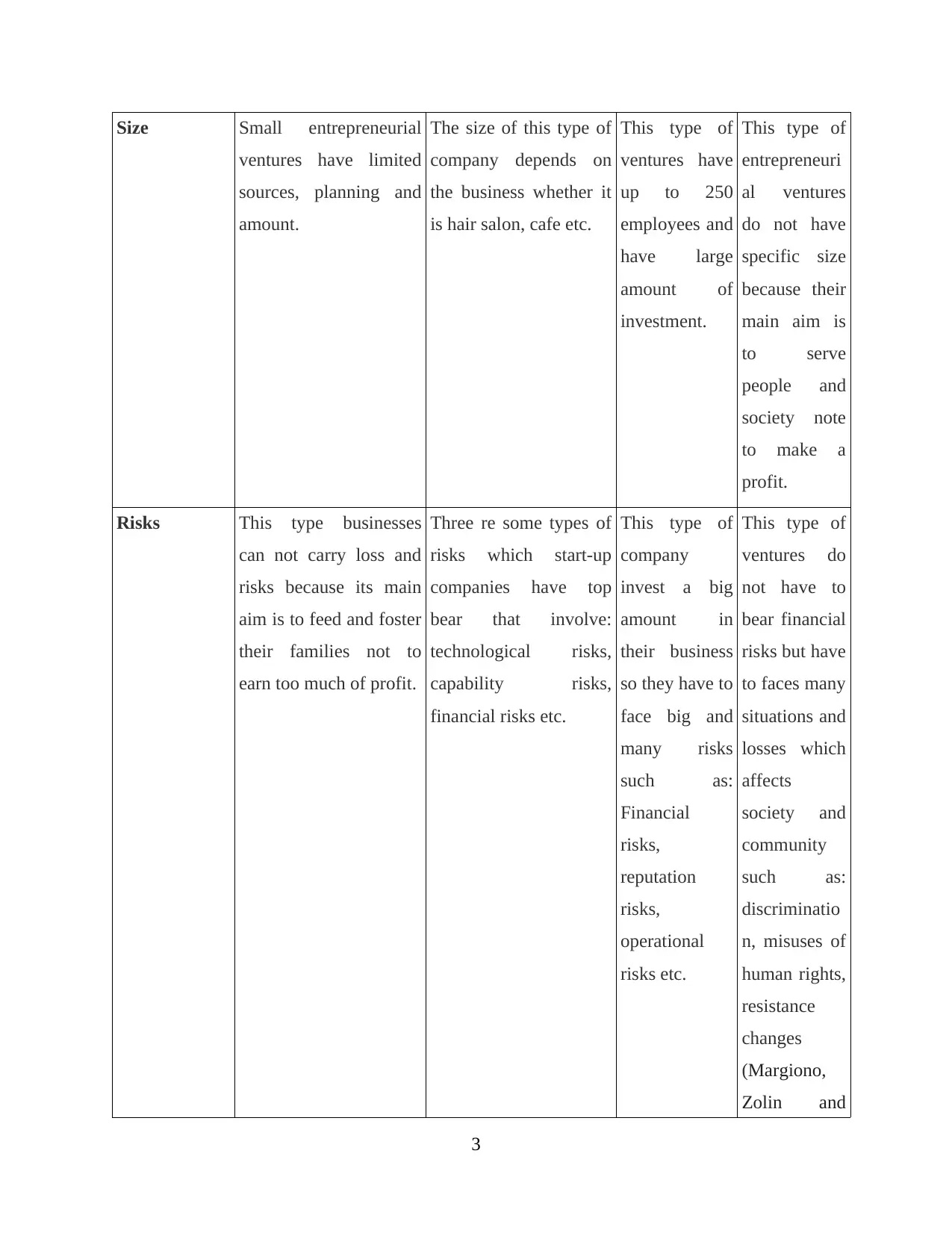
Size Small entrepreneurial
ventures have limited
sources, planning and
amount.
The size of this type of
company depends on
the business whether it
is hair salon, cafe etc.
This type of
ventures have
up to 250
employees and
have large
amount of
investment.
This type of
entrepreneuri
al ventures
do not have
specific size
because their
main aim is
to serve
people and
society note
to make a
profit.
Risks This type businesses
can not carry loss and
risks because its main
aim is to feed and foster
their families not to
earn too much of profit.
Three re some types of
risks which start-up
companies have top
bear that involve:
technological risks,
capability risks,
financial risks etc.
This type of
company
invest a big
amount in
their business
so they have to
face big and
many risks
such as:
Financial
risks,
reputation
risks,
operational
risks etc.
This type of
ventures do
not have to
bear financial
risks but have
to faces many
situations and
losses which
affects
society and
community
such as:
discriminatio
n, misuses of
human rights,
resistance
changes
(Margiono,
Zolin and
3
ventures have limited
sources, planning and
amount.
The size of this type of
company depends on
the business whether it
is hair salon, cafe etc.
This type of
ventures have
up to 250
employees and
have large
amount of
investment.
This type of
entrepreneuri
al ventures
do not have
specific size
because their
main aim is
to serve
people and
society note
to make a
profit.
Risks This type businesses
can not carry loss and
risks because its main
aim is to feed and foster
their families not to
earn too much of profit.
Three re some types of
risks which start-up
companies have top
bear that involve:
technological risks,
capability risks,
financial risks etc.
This type of
company
invest a big
amount in
their business
so they have to
face big and
many risks
such as:
Financial
risks,
reputation
risks,
operational
risks etc.
This type of
ventures do
not have to
bear financial
risks but have
to faces many
situations and
losses which
affects
society and
community
such as:
discriminatio
n, misuses of
human rights,
resistance
changes
(Margiono,
Zolin and
3
⊘ This is a preview!⊘
Do you want full access?
Subscribe today to unlock all pages.

Trusted by 1+ million students worldwide
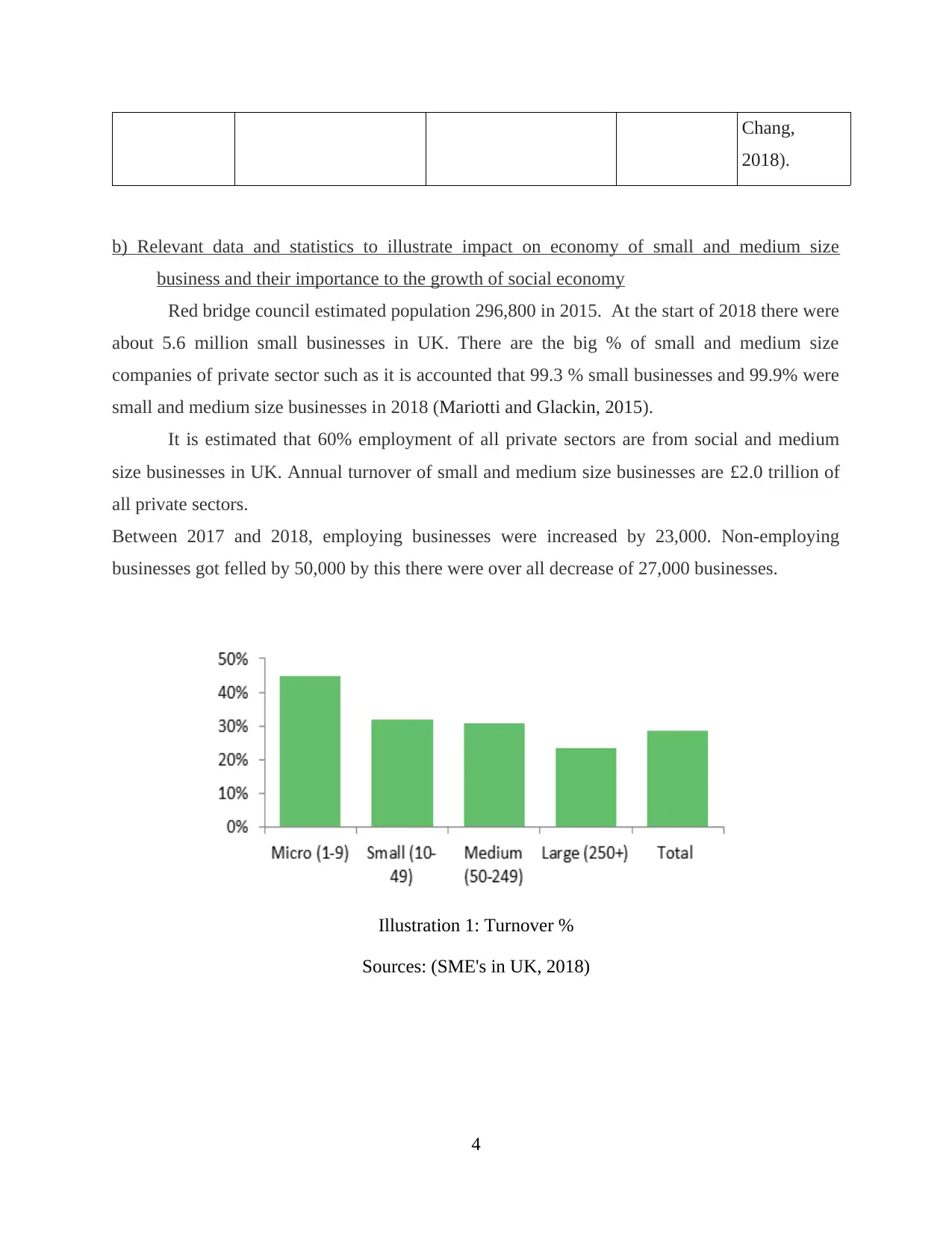
Chang,
2018).
b) Relevant data and statistics to illustrate impact on economy of small and medium size
business and their importance to the growth of social economy
Red bridge council estimated population 296,800 in 2015. At the start of 2018 there were
about 5.6 million small businesses in UK. There are the big % of small and medium size
companies of private sector such as it is accounted that 99.3 % small businesses and 99.9% were
small and medium size businesses in 2018 (Mariotti and Glackin, 2015).
It is estimated that 60% employment of all private sectors are from social and medium
size businesses in UK. Annual turnover of small and medium size businesses are £2.0 trillion of
all private sectors.
Between 2017 and 2018, employing businesses were increased by 23,000. Non-employing
businesses got felled by 50,000 by this there were over all decrease of 27,000 businesses.
4
Illustration 1: Turnover %
Sources: (SME's in UK, 2018)
2018).
b) Relevant data and statistics to illustrate impact on economy of small and medium size
business and their importance to the growth of social economy
Red bridge council estimated population 296,800 in 2015. At the start of 2018 there were
about 5.6 million small businesses in UK. There are the big % of small and medium size
companies of private sector such as it is accounted that 99.3 % small businesses and 99.9% were
small and medium size businesses in 2018 (Mariotti and Glackin, 2015).
It is estimated that 60% employment of all private sectors are from social and medium
size businesses in UK. Annual turnover of small and medium size businesses are £2.0 trillion of
all private sectors.
Between 2017 and 2018, employing businesses were increased by 23,000. Non-employing
businesses got felled by 50,000 by this there were over all decrease of 27,000 businesses.
4
Illustration 1: Turnover %
Sources: (SME's in UK, 2018)
Paraphrase This Document
Need a fresh take? Get an instant paraphrase of this document with our AI Paraphraser
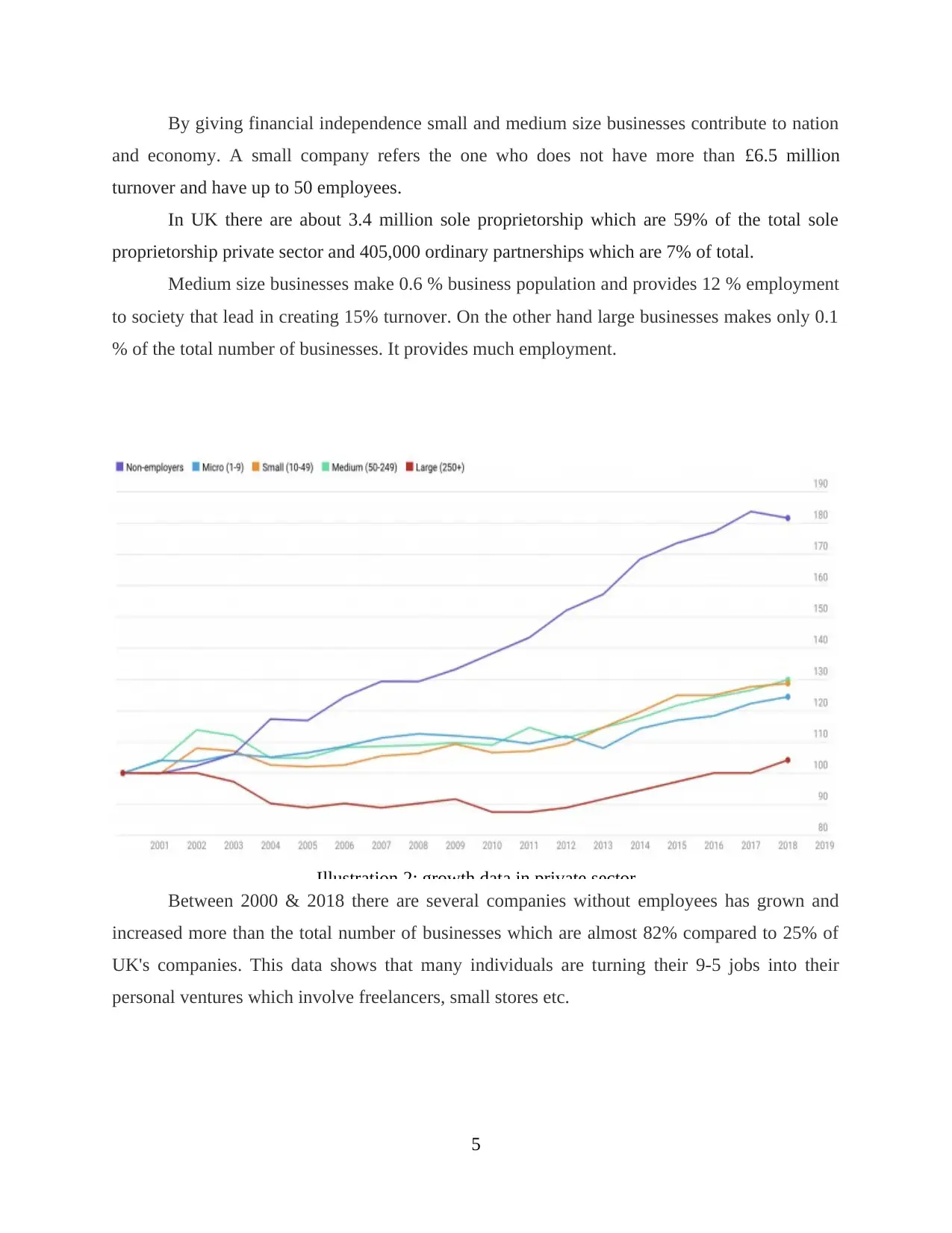
By giving financial independence small and medium size businesses contribute to nation
and economy. A small company refers the one who does not have more than £6.5 million
turnover and have up to 50 employees.
In UK there are about 3.4 million sole proprietorship which are 59% of the total sole
proprietorship private sector and 405,000 ordinary partnerships which are 7% of total.
Medium size businesses make 0.6 % business population and provides 12 % employment
to society that lead in creating 15% turnover. On the other hand large businesses makes only 0.1
% of the total number of businesses. It provides much employment.
Between 2000 & 2018 there are several companies without employees has grown and
increased more than the total number of businesses which are almost 82% compared to 25% of
UK's companies. This data shows that many individuals are turning their 9-5 jobs into their
personal ventures which involve freelancers, small stores etc.
5
Illustration 2: growth data in private sector
and economy. A small company refers the one who does not have more than £6.5 million
turnover and have up to 50 employees.
In UK there are about 3.4 million sole proprietorship which are 59% of the total sole
proprietorship private sector and 405,000 ordinary partnerships which are 7% of total.
Medium size businesses make 0.6 % business population and provides 12 % employment
to society that lead in creating 15% turnover. On the other hand large businesses makes only 0.1
% of the total number of businesses. It provides much employment.
Between 2000 & 2018 there are several companies without employees has grown and
increased more than the total number of businesses which are almost 82% compared to 25% of
UK's companies. This data shows that many individuals are turning their 9-5 jobs into their
personal ventures which involve freelancers, small stores etc.
5
Illustration 2: growth data in private sector
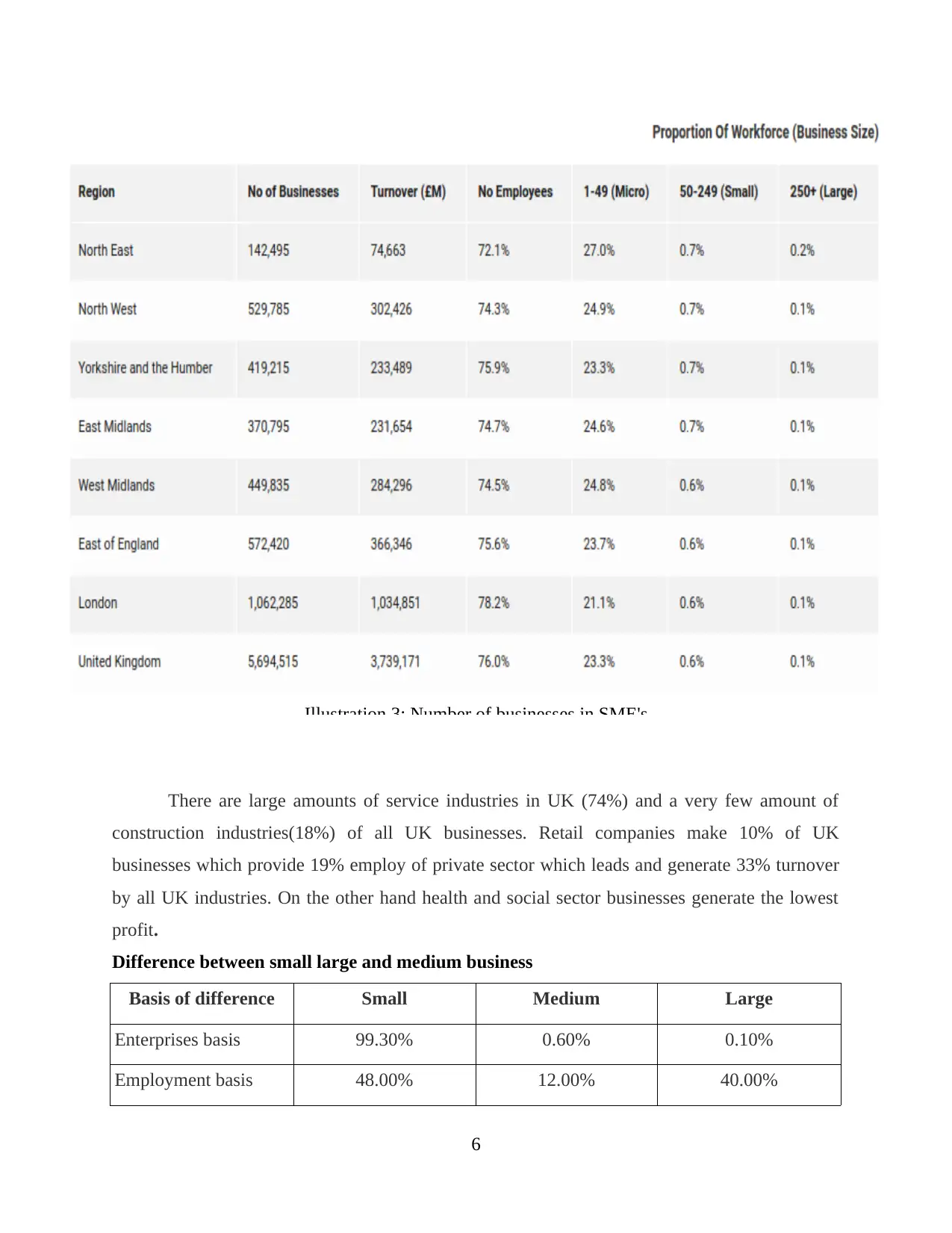
There are large amounts of service industries in UK (74%) and a very few amount of
construction industries(18%) of all UK businesses. Retail companies make 10% of UK
businesses which provide 19% employ of private sector which leads and generate 33% turnover
by all UK industries. On the other hand health and social sector businesses generate the lowest
profit.
Difference between small large and medium business
Basis of difference Small Medium Large
Enterprises basis 99.30% 0.60% 0.10%
Employment basis 48.00% 12.00% 40.00%
6
Illustration 3: Number of businesses in SME's
construction industries(18%) of all UK businesses. Retail companies make 10% of UK
businesses which provide 19% employ of private sector which leads and generate 33% turnover
by all UK industries. On the other hand health and social sector businesses generate the lowest
profit.
Difference between small large and medium business
Basis of difference Small Medium Large
Enterprises basis 99.30% 0.60% 0.10%
Employment basis 48.00% 12.00% 40.00%
6
Illustration 3: Number of businesses in SME's
⊘ This is a preview!⊘
Do you want full access?
Subscribe today to unlock all pages.

Trusted by 1+ million students worldwide
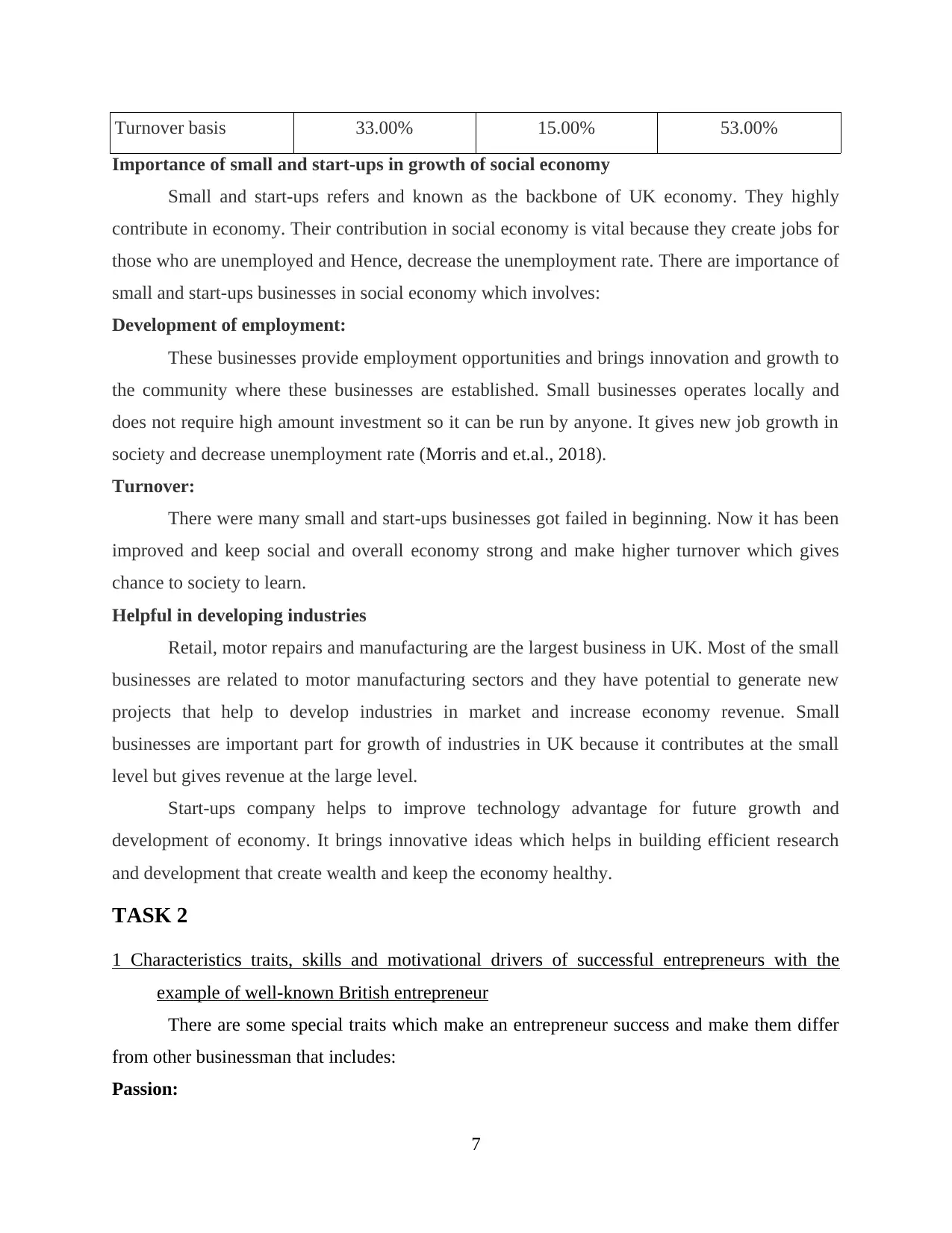
Turnover basis 33.00% 15.00% 53.00%
Importance of small and start-ups in growth of social economy
Small and start-ups refers and known as the backbone of UK economy. They highly
contribute in economy. Their contribution in social economy is vital because they create jobs for
those who are unemployed and Hence, decrease the unemployment rate. There are importance of
small and start-ups businesses in social economy which involves:
Development of employment:
These businesses provide employment opportunities and brings innovation and growth to
the community where these businesses are established. Small businesses operates locally and
does not require high amount investment so it can be run by anyone. It gives new job growth in
society and decrease unemployment rate (Morris and et.al., 2018).
Turnover:
There were many small and start-ups businesses got failed in beginning. Now it has been
improved and keep social and overall economy strong and make higher turnover which gives
chance to society to learn.
Helpful in developing industries
Retail, motor repairs and manufacturing are the largest business in UK. Most of the small
businesses are related to motor manufacturing sectors and they have potential to generate new
projects that help to develop industries in market and increase economy revenue. Small
businesses are important part for growth of industries in UK because it contributes at the small
level but gives revenue at the large level.
Start-ups company helps to improve technology advantage for future growth and
development of economy. It brings innovative ideas which helps in building efficient research
and development that create wealth and keep the economy healthy.
TASK 2
1 Characteristics traits, skills and motivational drivers of successful entrepreneurs with the
example of well-known British entrepreneur
There are some special traits which make an entrepreneur success and make them differ
from other businessman that includes:
Passion:
7
Importance of small and start-ups in growth of social economy
Small and start-ups refers and known as the backbone of UK economy. They highly
contribute in economy. Their contribution in social economy is vital because they create jobs for
those who are unemployed and Hence, decrease the unemployment rate. There are importance of
small and start-ups businesses in social economy which involves:
Development of employment:
These businesses provide employment opportunities and brings innovation and growth to
the community where these businesses are established. Small businesses operates locally and
does not require high amount investment so it can be run by anyone. It gives new job growth in
society and decrease unemployment rate (Morris and et.al., 2018).
Turnover:
There were many small and start-ups businesses got failed in beginning. Now it has been
improved and keep social and overall economy strong and make higher turnover which gives
chance to society to learn.
Helpful in developing industries
Retail, motor repairs and manufacturing are the largest business in UK. Most of the small
businesses are related to motor manufacturing sectors and they have potential to generate new
projects that help to develop industries in market and increase economy revenue. Small
businesses are important part for growth of industries in UK because it contributes at the small
level but gives revenue at the large level.
Start-ups company helps to improve technology advantage for future growth and
development of economy. It brings innovative ideas which helps in building efficient research
and development that create wealth and keep the economy healthy.
TASK 2
1 Characteristics traits, skills and motivational drivers of successful entrepreneurs with the
example of well-known British entrepreneur
There are some special traits which make an entrepreneur success and make them differ
from other businessman that includes:
Passion:
7
Paraphrase This Document
Need a fresh take? Get an instant paraphrase of this document with our AI Paraphraser
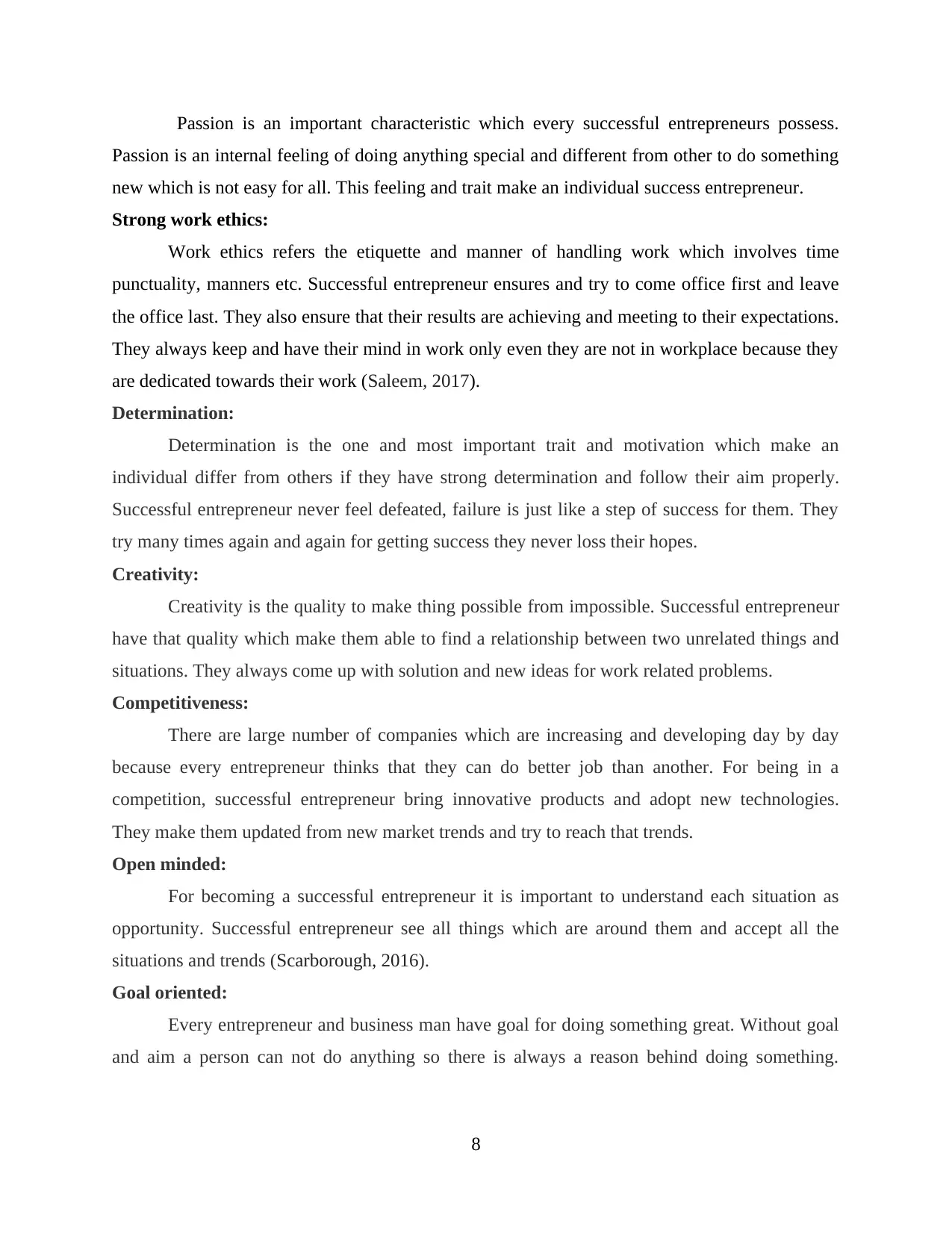
Passion is an important characteristic which every successful entrepreneurs possess.
Passion is an internal feeling of doing anything special and different from other to do something
new which is not easy for all. This feeling and trait make an individual success entrepreneur.
Strong work ethics:
Work ethics refers the etiquette and manner of handling work which involves time
punctuality, manners etc. Successful entrepreneur ensures and try to come office first and leave
the office last. They also ensure that their results are achieving and meeting to their expectations.
They always keep and have their mind in work only even they are not in workplace because they
are dedicated towards their work (Saleem, 2017).
Determination:
Determination is the one and most important trait and motivation which make an
individual differ from others if they have strong determination and follow their aim properly.
Successful entrepreneur never feel defeated, failure is just like a step of success for them. They
try many times again and again for getting success they never loss their hopes.
Creativity:
Creativity is the quality to make thing possible from impossible. Successful entrepreneur
have that quality which make them able to find a relationship between two unrelated things and
situations. They always come up with solution and new ideas for work related problems.
Competitiveness:
There are large number of companies which are increasing and developing day by day
because every entrepreneur thinks that they can do better job than another. For being in a
competition, successful entrepreneur bring innovative products and adopt new technologies.
They make them updated from new market trends and try to reach that trends.
Open minded:
For becoming a successful entrepreneur it is important to understand each situation as
opportunity. Successful entrepreneur see all things which are around them and accept all the
situations and trends (Scarborough, 2016).
Goal oriented:
Every entrepreneur and business man have goal for doing something great. Without goal
and aim a person can not do anything so there is always a reason behind doing something.
8
Passion is an internal feeling of doing anything special and different from other to do something
new which is not easy for all. This feeling and trait make an individual success entrepreneur.
Strong work ethics:
Work ethics refers the etiquette and manner of handling work which involves time
punctuality, manners etc. Successful entrepreneur ensures and try to come office first and leave
the office last. They also ensure that their results are achieving and meeting to their expectations.
They always keep and have their mind in work only even they are not in workplace because they
are dedicated towards their work (Saleem, 2017).
Determination:
Determination is the one and most important trait and motivation which make an
individual differ from others if they have strong determination and follow their aim properly.
Successful entrepreneur never feel defeated, failure is just like a step of success for them. They
try many times again and again for getting success they never loss their hopes.
Creativity:
Creativity is the quality to make thing possible from impossible. Successful entrepreneur
have that quality which make them able to find a relationship between two unrelated things and
situations. They always come up with solution and new ideas for work related problems.
Competitiveness:
There are large number of companies which are increasing and developing day by day
because every entrepreneur thinks that they can do better job than another. For being in a
competition, successful entrepreneur bring innovative products and adopt new technologies.
They make them updated from new market trends and try to reach that trends.
Open minded:
For becoming a successful entrepreneur it is important to understand each situation as
opportunity. Successful entrepreneur see all things which are around them and accept all the
situations and trends (Scarborough, 2016).
Goal oriented:
Every entrepreneur and business man have goal for doing something great. Without goal
and aim a person can not do anything so there is always a reason behind doing something.
8
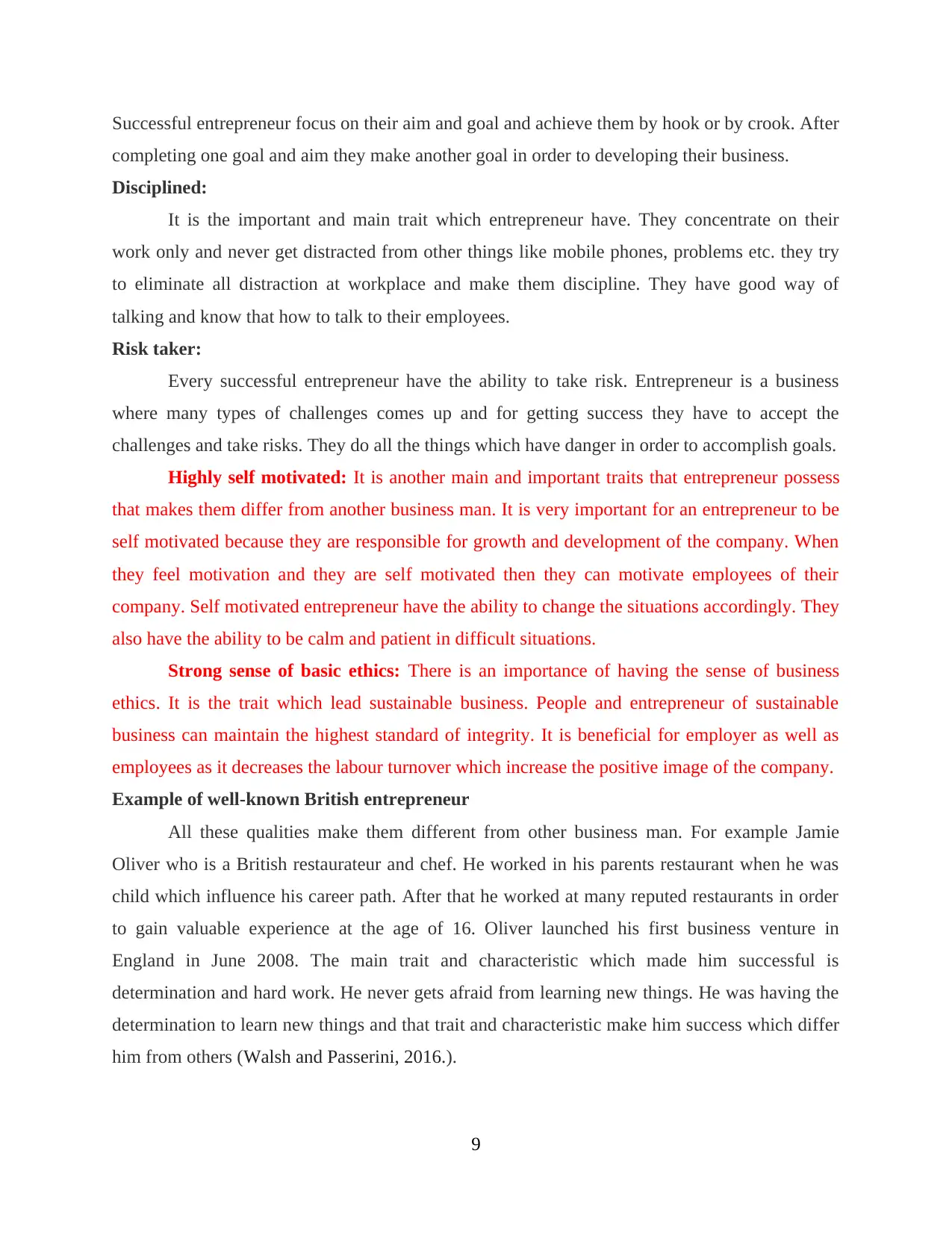
Successful entrepreneur focus on their aim and goal and achieve them by hook or by crook. After
completing one goal and aim they make another goal in order to developing their business.
Disciplined:
It is the important and main trait which entrepreneur have. They concentrate on their
work only and never get distracted from other things like mobile phones, problems etc. they try
to eliminate all distraction at workplace and make them discipline. They have good way of
talking and know that how to talk to their employees.
Risk taker:
Every successful entrepreneur have the ability to take risk. Entrepreneur is a business
where many types of challenges comes up and for getting success they have to accept the
challenges and take risks. They do all the things which have danger in order to accomplish goals.
Highly self motivated: It is another main and important traits that entrepreneur possess
that makes them differ from another business man. It is very important for an entrepreneur to be
self motivated because they are responsible for growth and development of the company. When
they feel motivation and they are self motivated then they can motivate employees of their
company. Self motivated entrepreneur have the ability to change the situations accordingly. They
also have the ability to be calm and patient in difficult situations.
Strong sense of basic ethics: There is an importance of having the sense of business
ethics. It is the trait which lead sustainable business. People and entrepreneur of sustainable
business can maintain the highest standard of integrity. It is beneficial for employer as well as
employees as it decreases the labour turnover which increase the positive image of the company.
Example of well-known British entrepreneur
All these qualities make them different from other business man. For example Jamie
Oliver who is a British restaurateur and chef. He worked in his parents restaurant when he was
child which influence his career path. After that he worked at many reputed restaurants in order
to gain valuable experience at the age of 16. Oliver launched his first business venture in
England in June 2008. The main trait and characteristic which made him successful is
determination and hard work. He never gets afraid from learning new things. He was having the
determination to learn new things and that trait and characteristic make him success which differ
him from others (Walsh and Passerini, 2016.).
9
completing one goal and aim they make another goal in order to developing their business.
Disciplined:
It is the important and main trait which entrepreneur have. They concentrate on their
work only and never get distracted from other things like mobile phones, problems etc. they try
to eliminate all distraction at workplace and make them discipline. They have good way of
talking and know that how to talk to their employees.
Risk taker:
Every successful entrepreneur have the ability to take risk. Entrepreneur is a business
where many types of challenges comes up and for getting success they have to accept the
challenges and take risks. They do all the things which have danger in order to accomplish goals.
Highly self motivated: It is another main and important traits that entrepreneur possess
that makes them differ from another business man. It is very important for an entrepreneur to be
self motivated because they are responsible for growth and development of the company. When
they feel motivation and they are self motivated then they can motivate employees of their
company. Self motivated entrepreneur have the ability to change the situations accordingly. They
also have the ability to be calm and patient in difficult situations.
Strong sense of basic ethics: There is an importance of having the sense of business
ethics. It is the trait which lead sustainable business. People and entrepreneur of sustainable
business can maintain the highest standard of integrity. It is beneficial for employer as well as
employees as it decreases the labour turnover which increase the positive image of the company.
Example of well-known British entrepreneur
All these qualities make them different from other business man. For example Jamie
Oliver who is a British restaurateur and chef. He worked in his parents restaurant when he was
child which influence his career path. After that he worked at many reputed restaurants in order
to gain valuable experience at the age of 16. Oliver launched his first business venture in
England in June 2008. The main trait and characteristic which made him successful is
determination and hard work. He never gets afraid from learning new things. He was having the
determination to learn new things and that trait and characteristic make him success which differ
him from others (Walsh and Passerini, 2016.).
9
⊘ This is a preview!⊘
Do you want full access?
Subscribe today to unlock all pages.

Trusted by 1+ million students worldwide
1 out of 17
Related Documents
Your All-in-One AI-Powered Toolkit for Academic Success.
+13062052269
info@desklib.com
Available 24*7 on WhatsApp / Email
![[object Object]](/_next/static/media/star-bottom.7253800d.svg)
Unlock your academic potential
Copyright © 2020–2026 A2Z Services. All Rights Reserved. Developed and managed by ZUCOL.




